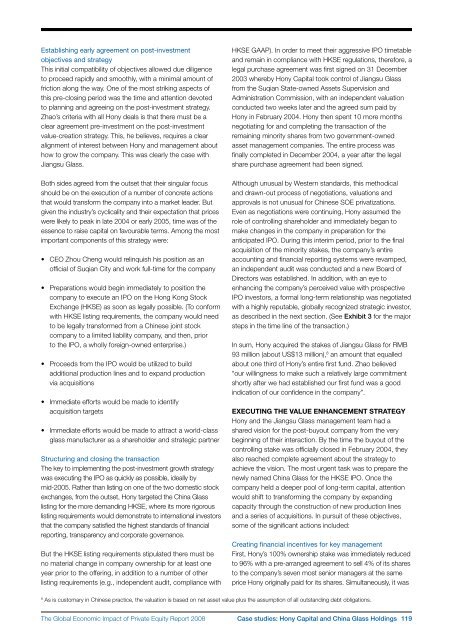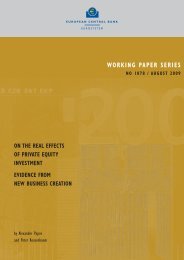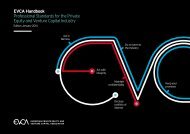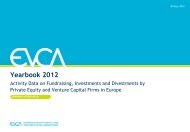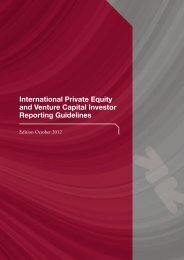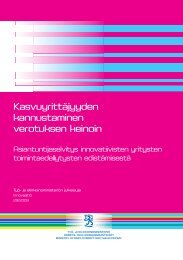industry standard where the top five manufacturers held a70% share <strong>of</strong> the world market, the top five in China onlyaccounted for about 20% <strong>of</strong> the domestic market. Zhao andhis team believed the industry was poised for consolidation,following the trend already occurring in many other sectorsthat were striving to enhance efficiency through larger scale.Hony also observed the considerable cyclicality in theindustry, and forecasted that prices would peak in late2004 or early 2005 before beginning a two‐year downturn.(See Exhibit 2 for an illustration <strong>of</strong> glass industry cyclicality.)Tactically, these forecasts guided Hony’s timetable for thebuyout and the subsequent IPO in early 2005.China Glass Holdings OverviewJiangsu Glass, located about halfway between Beijing andShanghai, was owned primarily by the municipal government<strong>of</strong> Suqian (a city in northern Jiangsu Province), with minoritystakes held by two other government‐owned assetmanagement companies. In 1996, the company had sufferedhuge losses and Suqian Vice Mayor Zhou Cheng wasappointed as the new CEO. He was given a mandate by thegovernment to clean house and turn around the money‐losingoperation. Although Zhou knew virtually nothing about theglass manufacturing industry, he quickly set out to streamlinethe company by disposing <strong>of</strong> all non‐essential assets, such asa hospital, a health clinic, schools and other facilities typicallyowned and operated by SOEs in China. He also revampedthe company’s balance sheet by successfully orchestrating amajor debt restructuring.<strong>The</strong> turnaround <strong>of</strong> Jiangsu Glass, led by Zhou, graduallybegan to transform the company into one <strong>of</strong> China’s mostefficient float glass producers, albeit with a relatively smallproduction capacity, even by domestic Chinese standards.Before the Hony investment, Jiangsu Glass had two floatglass production lines with a combined daily capacity <strong>of</strong> 900tons. Accounting for just 2% <strong>of</strong> the domestic market, it wasranked tenth in size among Chinese flat glass producers. Butit was number one in terms <strong>of</strong> return on total assets (beforetax and interest), according to the China Building MaterialsQuantity Supervision Association.Notwithstanding this impressive turnaround, by 2003the municipal government had decided to privatize JiangsuGlass, paying heed to the 2002 Party Congress directivethat “the government is not in the business <strong>of</strong> runningbusinesses”, and therefore every effort would be made bythe government to divest itself <strong>of</strong> businesses in highlycompetitive industries. In China, this significant policy shiftwas widely heralded as “state steps back, people stepforward”. Having successfully restructured the company,Zhou faced the challenge <strong>of</strong> severing ties with the localgovernment and competing as a private company.Just as Hony was being launched in mid‐2003, Hony CEOJohn Zhao arranged to meet Zhou for the first time. Althoughtheir initial encounter lasted less than an hour, even at thisearly stage the two CEOs concluded that they were thinkingalong similar lines about how to execute a buyout <strong>of</strong> thecompany and what was required to transform Jiangsu Glassinto one <strong>of</strong> China’s premier flat glass manufacturers. <strong>The</strong>yshared the conviction that the trend in China’s flat glassindustry was moving irreversibly towards greater consolidation,resulting in fewer and larger companies. In order to thrive inthis more competitive environment, Jiangsu Glass wouldneed to rapidly expand production. This in turn would requireaccess to both additional financial resources and industryexpertise. But instead <strong>of</strong> looking for a glass industry playeras an acquirer/investor, Jiangsu Glass preferred to workwith Hony, a private equity player. Zhou explained: “Ideallywe wanted to work with an investor like Hony that sharedour vision about how to grow the company. We would nothave maintained our independence and control if wemerged with a competitor from the industry.”<strong>The</strong> Hony‐China Glass TransactionAn alignment <strong>of</strong> interestsUnlike many private equity transactions that are marked byprotracted negotiations and at least some tension betweenbuyer and seller, Hony’s purchase <strong>of</strong> Jiangsu Glass wasfacilitated by a commonality <strong>of</strong> interests and objectivesamong the three principal stakeholders:• <strong>The</strong> company owner: <strong>The</strong> Suqian municipal governmentwas a highly motivated seller. As the Mayor explained,“<strong>The</strong> privatization <strong>of</strong> SOEs under our control was part<strong>of</strong> the larger Chinese policy to reduce the government’sfinancial burden and strengthen the private sector’s rolein the economy. We agreed with this new emphasis bythe central government because we were overburdenedby responsibilities to oversee SOEs, and unable to providethem with the financial resources they needed to growand compete.”• <strong>The</strong> company management: CEO Zhou Cheng explained:“We knew the Chinese glass industry was undergoingrapid consolidation that would increasingly favour a few<strong>of</strong> the largest players, and therefore we could not surviveas currently structured. Either we would be acquired byone <strong>of</strong> our larger competitors, or we needed to becomean acquirer, which would take additional capital.”• <strong>The</strong> private equity investor: <strong>The</strong> Jiangsu Glass pr<strong>of</strong>ile waswell-suited to the investment criteria established by therecently created Hony Capital. According to Zhao: “We wereactively seeking buyout opportunities [privatizations], andconstruction materials were a very good bet in a countrygrowing consistently at a 10% annual rate. Moreover, thesingle most important criteria for us was a high level <strong>of</strong>confidence in management, and after my first conversationwith Zhou Cheng I believed he was a person we could workwith. Just as we were getting started, Jiangsu Glasspresented us with an excellent investment opportunity.”118 Case studies: Hony Capital and China Glass Holdings<strong>The</strong> <strong>Global</strong> <strong>Economic</strong> <strong>Impact</strong> <strong>of</strong> <strong>Private</strong> <strong>Equity</strong> <strong>Report</strong> <strong>2008</strong>
Establishing early agreement on post‐investmentobjectives and strategyThis initial compatibility <strong>of</strong> objectives allowed due diligenceto proceed rapidly and smoothly, with a minimal amount <strong>of</strong>friction along the way. One <strong>of</strong> the most striking aspects <strong>of</strong>this pre‐closing period was the time and attention devotedto planning and agreeing on the post‐investment strategy.Zhao’s criteria with all Hony deals is that there must be aclear agreement pre‐investment on the post‐investmentvalue-creation strategy. This, he believes, requires a clearalignment <strong>of</strong> interest between Hony and management abouthow to grow the company. This was clearly the case withJiangsu Glass.Both sides agreed from the outset that their singular focusshould be on the execution <strong>of</strong> a number <strong>of</strong> concrete actionsthat would transform the company into a market leader. Butgiven the industry’s cyclicality and their expectation that priceswere likely to peak in late 2004 or early 2005, time was <strong>of</strong> theessence to raise capital on favourable terms. Among the mostimportant components <strong>of</strong> this strategy were:• CEO Zhou Cheng would relinquish his position as an<strong>of</strong>ficial <strong>of</strong> Suqian City and work full-time for the company• Preparations would begin immediately to position thecompany to execute an IPO on the Hong Kong StockExchange (HKSE) as soon as legally possible. (To conformwith HKSE listing requirements, the company would needto be legally transformed from a Chinese joint stockcompany to a limited liability company, and then, priorto the IPO, a wholly foreign‐owned enterprise.)• Proceeds from the IPO would be utilized to buildadditional production lines and to expand productionvia acquisitions• Immediate efforts would be made to identifyacquisition targets• Immediate efforts would be made to attract a world‐classglass manufacturer as a shareholder and strategic partnerStructuring and closing the transaction<strong>The</strong> key to implementing the post‐investment growth strategywas executing the IPO as quickly as possible, ideally bymid‐2005. Rather than listing on one <strong>of</strong> the two domestic stockexchanges, from the outset, Hony targeted the China Glasslisting for the more demanding HKSE, where its more rigorouslisting requirements would demonstrate to international investorsthat the company satisfied the highest standards <strong>of</strong> financialreporting, transparency and corporate governance.But the HKSE listing requirements stipulated there must beno material change in company ownership for at least oneyear prior to the <strong>of</strong>fering, in addition to a number <strong>of</strong> otherlisting requirements (e.g., independent audit, compliance withHKSE GAAP). In order to meet their aggressive IPO timetableand remain in compliance with HKSE regulations, therefore, alegal purchase agreement was first signed on 31 December2003 whereby Hony Capital took control <strong>of</strong> Jiangsu Glassfrom the Suqian State‐owned Assets Supervision andAdministration Commission, with an independent valuationconducted two weeks later and the agreed sum paid byHony in February 2004. Hony then spent 10 more monthsnegotiating for and completing the transaction <strong>of</strong> theremaining minority shares from two government‐ownedasset management companies. <strong>The</strong> entire process wasfinally completed in December 2004, a year after the legalshare purchase agreement had been signed.Although unusual by Western standards, this methodicaland drawn‐out process <strong>of</strong> negotiations, valuations andapprovals is not unusual for Chinese SOE privatizations.Even as negotiations were continuing, Hony assumed therole <strong>of</strong> controlling shareholder and immediately began tomake changes in the company in preparation for theanticipated IPO. During this interim period, prior to the finalacquisition <strong>of</strong> the minority stakes, the company’s entireaccounting and financial reporting systems were revamped,an independent audit was conducted and a new Board <strong>of</strong>Directors was established. In addition, with an eye toenhancing the company’s perceived value with prospectiveIPO investors, a formal long‐term relationship was negotiatedwith a highly reputable, globally recognized strategic investor,as described in the next section. (See Exhibit 3 for the majorsteps in the time line <strong>of</strong> the transaction.)In sum, Hony acquired the stakes <strong>of</strong> Jiangsu Glass for RMB93 million (about US$13 million), 8 an amount that equalledabout one third <strong>of</strong> Hony’s entire first fund. Zhao believed“our willingness to make such a relatively large commitmentshortly after we had established our first fund was a goodindication <strong>of</strong> our confidence in the company”.Executing the value enhancement strategyHony and the Jiangsu Glass management team had ashared vision for the post‐buyout company from the verybeginning <strong>of</strong> their interaction. By the time the buyout <strong>of</strong> thecontrolling stake was <strong>of</strong>ficially closed in February 2004, theyalso reached complete agreement about the strategy toachieve the vision. <strong>The</strong> most urgent task was to prepare thenewly named China Glass for the HKSE IPO. Once thecompany held a deeper pool <strong>of</strong> long‐term capital, attentionwould shift to transforming the company by expandingcapacity through the construction <strong>of</strong> new production linesand a series <strong>of</strong> acquisitions. In pursuit <strong>of</strong> these objectives,some <strong>of</strong> the significant actions included:Creating financial incentives for key managementFirst, Hony’s 100% ownership stake was immediately reducedto 96% with a pre‐arranged agreement to sell 4% <strong>of</strong> its sharesto the company’s seven most senior managers at the sameprice Hony originally paid for its shares. Simultaneously, it was8As is customary in Chinese practice, the valuation is based on net asset value plus the assumption <strong>of</strong> all outstanding debt obligations.<strong>The</strong> <strong>Global</strong> <strong>Economic</strong> <strong>Impact</strong> <strong>of</strong> <strong>Private</strong> <strong>Equity</strong> <strong>Report</strong> <strong>2008</strong> Case studies: Hony Capital and China Glass Holdings 119
- Page 2 and 3:
The Globalization of Alternative In
- Page 5:
ContributorsCo-editorsAnuradha Guru
- Page 9 and 10:
PrefaceKevin SteinbergChief Operati
- Page 11 and 12:
Letter on behalf of the Advisory Bo
- Page 13 and 14:
Executive summaryJosh lernerHarvard
- Page 15 and 16:
• Private equity-backed companies
- Page 17 and 18:
C. Indian casesThe two India cases,
- Page 19 and 20:
Part 1Large-sample studiesThe Globa
- Page 21 and 22:
The new demography of private equit
- Page 23 and 24:
among US publicly traded firms, it
- Page 25 and 26:
should be fairly complete. While th
- Page 27 and 28:
according to Moody’s (Hamilton et
- Page 29 and 30:
draining public markets of firms. I
- Page 31 and 32:
FIguresFigure 1A: LBO transactions
- Page 33 and 34:
TablesTable 1: Capital IQ 1980s cov
- Page 35 and 36:
Table 2: Magnitude and growth of LB
- Page 37 and 38:
Table 4: Exits of individual LBO tr
- Page 39 and 40:
Table 6: Determinants of exit succe
- Page 41 and 42:
Table 7: Ultimate staying power of
- Page 43 and 44:
Appendix 1: Imputed enterprise valu
- Page 45 and 46:
Private equity and long-run investm
- Page 47 and 48:
alternative names associated with t
- Page 49 and 50:
4. Finally, we explore whether firm
- Page 51 and 52:
When we estimate these regressions,
- Page 53 and 54:
cutting back on the number of filin
- Page 55 and 56:
Table 1: Summary statisticsPanel D:
- Page 57 and 58:
Table 4: Relative citation intensit
- Page 59 and 60:
figuresFigure 1: Number of private
- Page 61 and 62:
Private equity and employment*steve
- Page 63 and 64:
Especially when taken together, our
- Page 65 and 66:
centred on the transaction year ide
- Page 67 and 68:
and Vartia 1985.) Aggregate employm
- Page 69 and 70:
sectors. In Retail Trade, the cumul
- Page 71 and 72:
employment-weighted acquisition rat
- Page 73 and 74:
FIguresFigure 1: Matches of private
- Page 75 and 76:
Figure 6:Figure 6A: Comparison of n
- Page 77 and 78:
Figure 8:Figure 8A: Comparison of j
- Page 79 and 80:
Figure 11: Variation in impact in e
- Page 81 and 82:
Figure 12: Differences in impact on
- Page 83 and 84:
Private equity and corporate govern
- Page 85 and 86: et al (2007) track the evolution of
- Page 87 and 88: groups aim to improve firm performa
- Page 89 and 90: distribution of the LBO sponsors, m
- Page 91 and 92: the most difficult cases. This stor
- Page 93 and 94: to see whether these changes of CEO
- Page 95 and 96: Figure 3:This figure represents the
- Page 97 and 98: TablesTable 1: Company size descrip
- Page 99 and 100: Table 5: Changes in the board size,
- Page 101 and 102: Table 7: Board turnoverPanel A: Siz
- Page 103 and 104: Part 2Case studiesThe Global Econom
- Page 105 and 106: European private equity cases: intr
- Page 107 and 108: Exhibit 1: Private equity fund size
- Page 109 and 110: Messer Griesheimann-kristin achleit
- Page 111 and 112: ealized it was not possible to grow
- Page 113 and 114: The deal with Allianz Capital partn
- Page 115 and 116: the deal, the private equity invest
- Page 117 and 118: Exhibit 1: The Messer Griesheim dea
- Page 119 and 120: Exhibit 5: Post buyout structureMes
- Page 121 and 122: New Lookann-kristin achleitnerTechn
- Page 123 and 124: feet. This restricted store space w
- Page 125 and 126: institutional investors why this in
- Page 127 and 128: Although a public listing did not a
- Page 129 and 130: Exhibit 5: Employment development a
- Page 131 and 132: Chinese private equity cases: intro
- Page 133 and 134: Hony Capital and China Glass Holdin
- Page 135: Hony’s Chinese name means ambitio
- Page 139 and 140: Executing the IPOEach of the initia
- Page 141 and 142: Exhibit 1A: Summary of Hony Capital
- Page 143 and 144: Exhibit 4: Members of the China Gla
- Page 145 and 146: Exhibit 6A: China Glass post‐acqu
- Page 147 and 148: Exhibit 8: China Glass stock price
- Page 149 and 150: 3i Group plc and Little Sheep*Lily
- Page 151 and 152: y an aggressive franchise strategy,
- Page 153 and 154: soul” of the business. But there
- Page 155 and 156: Exhibit 1: Summary information on 3
- Page 157 and 158: Exhibit 6: An excerpt from the 180-
- Page 159 and 160: Indian private equity cases: introd
- Page 161 and 162: ICICI Venture and Subhiksha *Lily F
- Page 163 and 164: investment,” recalled Deshpande.
- Page 165 and 166: 2005 - 2007: Moderator, protector a
- Page 167 and 168: Exhibit 3: Subhiksha’s board comp
- Page 169 and 170: Warburg Pincus and Bharti Tele‐Ve
- Page 171 and 172: founded two companies at this time
- Page 173 and 174: By 2003 this restructuring task was
- Page 175 and 176: Exhibit 1C: Private equity investme
- Page 177 and 178: Exhibit 4B: Bharti cellular footpri
- Page 179 and 180: Exhibit 6: Summary of Bharti’s fi
- Page 181 and 182: Exhibit 7: Bharti’s board structu
- Page 183 and 184: In the 1993‐94 academic year, he
- Page 185 and 186: consumer products. She was also a R
- Page 187 and 188:
AcknowledgementsJosh LernerHarvard
- Page 189:
The World Economic Forum is an inde


